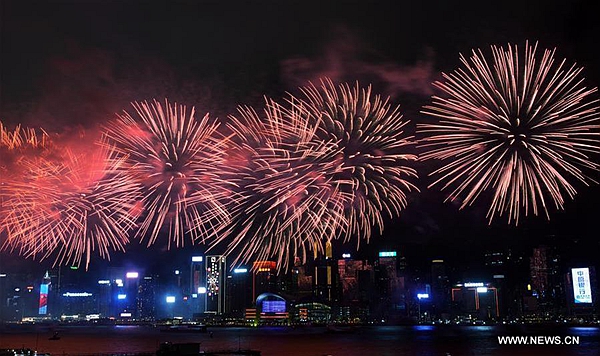Hong Kong, mainland and good advice
- By Kyle Calandra
 0 Comment(s)
0 Comment(s) Print
Print E-mail China.org.cn, July 6, 2017
E-mail China.org.cn, July 6, 2017
|
|
|
Fireworks light up the sky during a fireworks show to mark the 20th anniversary of Hong Kong's return to the motherland in Hong Kong, south China, July 1, 2017. [Xinhua] |
On Saturday, Chinese President Xi Jinping marked his first formal visit to Hong Kong with a speech in observance of the 20th anniversary of what is known internationally as "the Handover," or the end of Great Britain's 99 year lease and the transfer of the territory's sovereignty to China.
For Nectar Gan, writing for South China Morning Post (SCMP), the loss of Hong Kong to the British is seen as a symbolic moment which marked the unofficial beginning of China's 100 years of humiliation.
In his speech, President Xi referenced the city's unique history, and spoke about the country's resumption of sovereignty over Hong Kong as one part of China's efforts to spur a national revival that started over 30 years ago. Perhaps as unique as the city's history, Deng Xiaoping devised a visionary "one country, two systems" policy in advance to define the future of Hong Kong's critical role in a China that had already begun opening it's doors to the spirit of progress.
Deng's system would allow the established economic institutions in Hong Kong to continue to flourish unaffected, acting as a mediator between China and the international community. When the country resumed sovereignty over Hong Kong, the city accounted for roughly 18 percent of China's GDP and was seen as the pivotal figurehead of a burgeoning economy adapting to the challenges of reform and opening up after years of isolation.
Twenty years on, things have changed drastically as Hong Kong now accounts for only 2 percent of China's GDP.
With only a fraction of its once essential economic might, the city may prove just as important when it comes to another aspect of China's symbolic revival.
Reflecting on the last 20 years of resumed sovereignty, Xi Jinping referenced the Chinese dream in his speech on Saturday, saying, "Right now, our country is at the decisive stage of building a moderately prosperous society in all aspects, and people of all ethnicities in China are striving in unity to achieve the two centenary goals and the Chinese dream of the great rejuvenation of the Chinese nation." He went on to say, "The destiny of Hong Kong has always been intricately bound with that of the motherland."
Regardless of Hong Kong's economic impact, its power, as a symbolic reminder of China's past and as a new symbol of China's future, remains strong. Moreover, the story of Hong Kong and the mainland in recent years perfectly reflects the most impactful aspect of the president's speech, a focus on unity.
In the 20 years to come, how the mainland and Hong Kong reconcile the "one country, two systems" policy and achieve a state of equilibrium could be the key to China's future as a country rising to meet a set of unique and unprecedented economic challenges.
Negotiating the divide between the more freewheeling aspects of economic liberalization and a brand of socialism with Chinese characteristics may prove the country's single greatest test throughout the next century. As challenging as the task may be for the world's second largest economy, it's also very exciting.
In an article for SCMP, David Dodwell shares vital insight as the executive director of the Hong Kong-APEC Trade Policy Group and offers what he believes "good advice."
Speaking to a business audience days before retiring in 2000, Andrew Burns, Britain's first consul general to Hong Kong after the 1997 handover asked himself what he would say in summary about Hong Kong's future, "If I were given two words, I would say: Don't Worry."
Having previously lived in Beijing working as a journalist and editor, Kyle Calandra is currently based in America reporting on Sino-U.S. Relations as a contributor for China.org.cn.
Opinion articles reflect the views of their authors only, not necessarily those of China.org.cn.






